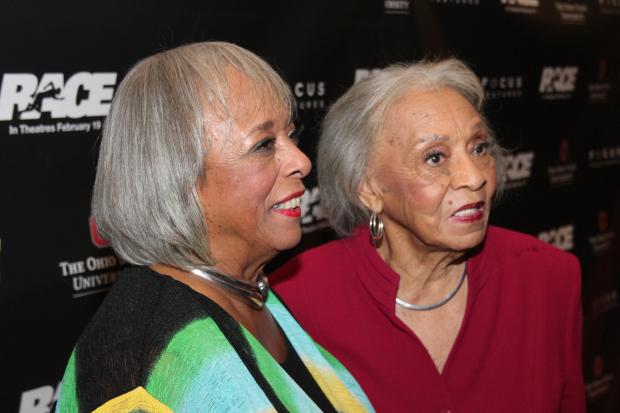Advertisement
Speaking to a reporter before a screening of Race at OSU’s Mershon Auditorium, one of Jesse Owens’s daughters said several changes were made to the script for the sake of historical accuracy.
That’s nice to hear. The tale of Owens’s participation in the 1936 Olympics in Berlin is intrinsically so dramatic and inspiring that it would be a shame to sully it with blatant inaccuracies.
As you probably know, Owens was the African-American track and field star who symbolically thumbed his nose at Hitler’s theory of Aryan superiority at the pre-World War II Olympics. For Central Ohioans, he also was a hometown hero. After racking up an impressive record as a high school athlete in Cleveland, he came to Ohio State and fell under the tutelage of track coach Larry Snyder.
This is where director Stephen Hopkins’s film takes up the story. Snyder (Jason Sudeikis) calls Owens (Stephen James) into his office and demands to know whether he’s ready to work hard. He also begins plying him with the notion that track records are made to be broken, but medals are forever. In no time, it seems, the two are setting their sights on the 1936 Olympics.
The early scenes between Owens and Snyder do a pretty good job of setting up their relationship while avoiding the Hollywood tendency of making a white person the hero of a black person’s story. But it’s when screenwriters Joe Shrapnel and Anna Waterhouse turn their attention to the Olympics that the film really sets itself apart.
American Olympics official Avery Brundage (Jeremy Irons) is shown arguing against widespread calls to boycott the 1936 Games as a protest against Nazi racism. He’s sent to Berlin to scope out the situation and soon locks horns with Nazi propaganda minister Joseph Goebbels (Barnaby Metschurat), who sees the Olympics as way to promote the party’s agenda. A deal is struck—some might say a deal with the devil—and the boycott is narrowly avoided.
Meanwhile, Owens is faced with a boycott dilemma of his own: Should he sit out the Games to make a statement against racism, knowing that all his hard work will be wasted in the process? When a representative from the NAACP meets with him, it only complicates the issue.
Needless to say, Owens does make it to Berlin, and that’s when the flick really kicks into emotional high gear. Watching him stride into a packed stadium and prepare to do his thing while Goebbels, Hitler and scores of Nazi movie cameras watch on, you get a sense of his unique situation. He’s striving not only for personal and national glory but to make a statement against a racist ideology.
Peter Levy’s cinematography is particularly strong during these scenes, and Rachel Portman’s score is appropriately stirring, making up for its earlier tendency toward heavy-handedness.
Acting-wise, the cast does everything that’s expected of it. James’s Owens is determined and stolid, while SNL alum Sudeikis keeps his comic tendencies at bay as coach Snyder. Besides the always-good Irons, important supporting roles are played by Shanice Banton as the mother of Jesse’s young daughter and Carice van Houten in a surprisingly sympathetic portrayal of Nazi filmmaker Leni Riefenstahl.
Race is not a revelatory depiction of Jesse Owens in the way that Selma was a revelatory depiction of Martin Luther King Jr. You don’t come away feeling you know what made Owens tick. But you do come away feeling you had a front-row seat at a key moment in 20th-century history—a moment when good, if only symbolically, stood up to evil.
That alone is worth the price of admission.
Rating: 4 stars (out of 5)
Race, rated PG-13, opens Friday (Feb. 19) at theaters nationwide.
Denver newspaper takes on pot challenge
If Ohioans had voted to make marijuana legal last November, how would The Columbus Dispatch have reacted? Would it have hired a pot editor to keep tabs on the newly legal market, and pot critics to advise consumers on the best ways to get high?
Doubtful, to say the least. Yet that’s just what The Denver Post did when pot became legal in Colorado on Jan. 1, 2014. As the entertaining documentary Rolling Papers demonstrates, the newspaper took marijuana very seriously.
Directed by Mitch Dickman, the film follows pot editor Ricardo Baca and other journalists around throughout 2014. The marijuana beat is not all fun and games, we learn. Most seriously, their coverage reveals that the state is far from prepared to regulate pot products and sales.
When consumers complain an edible product has failed to have its desired effect because its “THC” level is lower than advertised, the journalists realize it’s a safety issue: An unsuspecting user might conclude the answer is to eat more pot-laced products and could well overdose if those products actually contained the amount of THC they were supposed to have.
Until the Post raised the issue, the state had worried only about products that were too potent, not those that were less potent than advertised.
Dickman’s documentary is a little scattershot, hopping around from issue to issue and journalist to journalist, and even following Baca on a fact-gathering trip to Uruguay, the first country to legalize marijuana. But it addresses important issues along the way.
One of those issues is the shaky status of print journalism in the 21st century, which seems to be one reason the Post jumped headfirst into the pot issue. New readers, high or otherwise, are always welcome.
If legal marijuana ever makes it to Ohio, The Columbus Dispatch might want to keep that in mind.
Rating: 3½ stars (out of 5)
Rolling Papers (unrated) opens Friday (Feb. 19) at the Gateway Film Center in Columbus.
CUTLINE FOR IMG_1240 (optional):
Jesse Owens’s daughters Marlene Owens Rankin (left) and Gloria Owens Hemphill attend an advance screening of Race at Ohio State’s Mershon Auditorium (photo by Richard Ades)
CUTLINE FOR RACE:
The whole world is watching as Jesse Owens (Stephen James) prepares to compete in the 1936 Olympics in Race (Focus Features)
CUTLINE FOR ROLLING PAPERS:
Marijuana critic Jake Browne prepares to sample a product in Rolling Papers (photo courtesy of Alchemy)




